Missing Census or Missing Family: Legacy Tree Genealogists Answer
So, you think there might be a missing census page? Whether it’s a missing census or a missing family, my special guest, professional genealogist Kate Eakman from Legacy Tree Genealogists has strategies to help you figure it out. She has just the answers you need to find your ‘missing’ family.
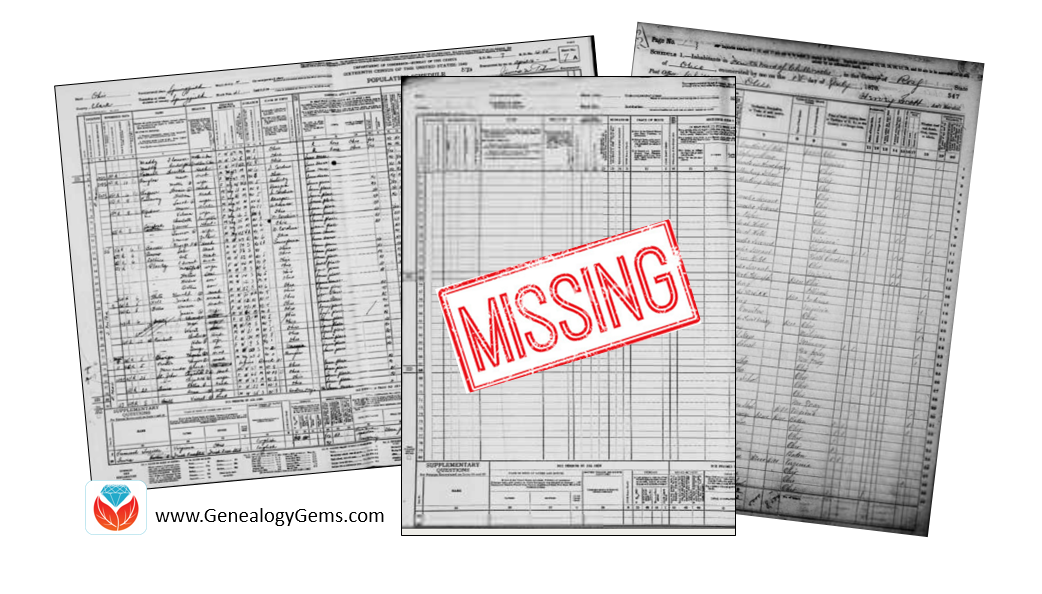
A Genealogy Gems reader doing genealogy research in New Jersey has lost her family! Well not literally, but she can’t find them in the 1940 U.S. Census. Here’s the email I recently received from her:
I am having a problem finding my mother and grandparents in the 1940 census. My grandfather, William Charles Opfer, was born on October 15 1900. I can find him in the 1930 census living in Glouescter Township, (Unincorporated Grenloch) Camden County, New Jersey. He is living with his wife Kathryn (Katharine) Opfer and three children: William C Jr, Robert, and Nancy (my mother).
When I search the 1940 census on Ancestry nothing shows up. So I went to the government web site and converted the 1930 Enumeration District to the 1940 Enumeration District. The 1940 Enumeration Districts were 4-57, 4-58, and 4-61. I then went through all of the pages for each of the districts looking for William C. Opfer. I did this on Ancestry, Family Search, and NARA. No William C. Opfer.
I then went back to the 1930 census and looked at his neighbors. I searched for each of the 13 heads-of-household neighbors from the 1930 census. Two had moved 1940 and I found them. I could not find the other neighbors in the 1940 census. I am wondering if a page from the 1940 census did not get scanned? Is there somewhere else I could look?
Missing Census Answers from Kate Eakman, Legacy Tree Genealogists
First, let me say how impressed I am with this Gem’s research and her dedication to finding this census report. She has made some very thorough searches and performed a number of advanced genealogical techniques in her quest for the 1940 U.S. Census page. It hardly seems fair that all that work didn’t yield the success she surely earned.
The government website she referenced is the National Archives 1940 Census page. The use of the page “1930 Records Search” allowed her to simply locate her grandfather in the 1930 U.S. Census. Then, by clicking a few buttons, discover the corresponding enumeration districts (ED) for the 1930 ED in which he and his family lived: 4-57, 4-58, and 4-61.

I, too, have scrolled through page after page searching for that one elusive name and we know how tedious that task can be! Using three different sites was a good strategy and one that we employ ourselves here at Legacy Tree Genealogists. Different images might be easier or more difficult to read, although in the case of these three EDs, the copies seemed to be uniformly easy to read.
The first two EDs were for Blackwood, an unincorporated part of Camden County, New Jersey. The third one was for the Lakeland Tuberculosis Hospital, unlikely to have housed the entire family, but certainly worth looking through in case one Opfer was a patient there.
ED 4-58 had an interesting variation at the end of the report. The last two pages were not 15A and 15B, as would be expected, but were 61A and 61B. This indicates these households were enumerated at a later date than were their neighbors. Because federal law requires every household to be counted, and because not everyone was at home when the enumerator arrived, the enumerator had to return on a different day and attempt to gather the necessary information for those families. They were recorded separately, beginning with page 61A.
People living in hotels, trailer camps, and other places normally designed for single-night stays were enumerated a week after the initial enumeration and those pages are numbered beginning with 81A. Not every ED has a 61 or an 81 page, but if you see one, now you know why the page numbers suddenly changed so dramatically.
The writer’s use of Elizabeth Shown Mills’ FAN Club was an excellent idea, too. FAN, an acronym for Friends, Associates, and Neighbors, takes advantage of the fact that people, in general, tend to remain geographically close to the people they know. [Read more about this in our post, “The Genealogy FAN Club Principle Overcomes Genealogy Brick Walls“] If a portion of a community moves, they tend to move together and relocate in the same general area of their new location. Her instincts to use this tool were excellent, even if they did not produce the desired results. This falls under the heading of “reasonably exhaustive research” and should always be included when someone, or in this case something, can’t be found, but should be there.
The fact that the researcher was able to locate only two of those neighbors could be explained, in part, by the fact that so many were in their 60s, 70s, and even 90s in 1930. They simply may have passed away in the intervening ten years. Another explanation, particularly for the working families, is that the Great Depression caused many families to move in order to find employment.
This may have been true for the Opfers. We noticed in 1930, William was employed as a supervisor for Reading Transportation. While supervisors were important to the operation of any transportation company, it is possible William found himself unemployed, as was true for millions of other Americans. If that happened, he and his family could have moved anywhere in the United States in an effort to find work. Alternatively, William may have left to find work while Kathryn and the children lived by themselves in reduced circumstances, or with family or friends.
To this end, I searched for William and Kathryn, and then each of the three children individually, in the hope of locating one or more family members. Using the “less is more” strategy which is often an important part of genealogical research, I searched with and without the family members’ ages, places of birth, and other family member’s names. Because the surname “Opfer” might have been misheard by the enumerator or grossly misspelled, I even searched for the various members of the family with no surname. Since we did not know where the family may have lived between 1930 and 1944, we included all of New Jersey, Delaware (the home state of Kathryn), as well as neighboring Pennsylvania and New York in our searches. The lack of positive results meant we needed to expand our search to the Eastern seaboard, and then the entire United States.
We also identified the names of William’s and Kathryn’s parents, William and Sallie Opfer and Raymond and Corrine Mason, and searched their households and neighborhoods for William and Kathryn. They were not there. Walter, William’s younger brother, was not hosting the family, either.
The writer had asked if it was possible that a page from the 1940 U.S. Census did not get scanned. Since the 1940 census has only been available for four years, it is still possible, although not probable, that there are one or more pages missing unbeknownst to anyone. Our research revealed only a few pages from a couple EDs in Ohio and South Dakota that were missing from the FamilySearch collection. There is no indication anywhere that there are missing pages from New Jersey. In addition, the pages in the three possible EDs for the Opfers were all included and in the correct numerical order, with no indication of any missing pages at the end. Therefore, I think we must conclude that missing pages do not explain the Opfer family’s disappearance.
Other Databases to Help
There are two other databases which might provide some insight into the location of the Opfer family. The first is the set of 1942 World War II draft registration cards. All men between the ages of 18 and 65 were required to register for this draft. The draft registration cards would have included the address at which William lived in 1942; however, there was no card for a man named William Opfer (or with only the surname “Opfer”) born between 1895 and 1905.
The final search was the database of city directories. A poorly-indexed city directory reported the Opfers lived in Haddonfield, New Jersey in 1943, but there are two directories contained in the same book, and the listing was actually for 1947. It reported William and Katherine lived at 209 Washington Avenue with their children William and his wife, Robert, and Nancy. William’s brother, Walter, and his wife Edith lived nearby. Unfortunately, the search for them in 1940 revealed that 79-year-old widower William Pape lived at that address with his household servants who were not the Opfer’s.
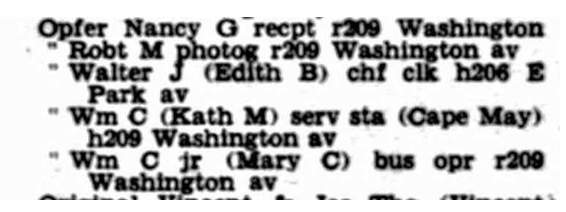
The William Opfer family in Haddonfield, New Jersey in 1947.Photo courtesy Ancestry.
Although the turmoil and upheaval of the Great Depression meant families were scattered, and it would have been easy to miss enumerating many households in the mid-1930s, by 1940 the U.S. was recovering from the effects of the Depression. Some agencies, such as the Works Progress Administration (WPA) and the CCC (Civilian Conservation Corps), were in place to provide work for men. Many war-related industries on both coasts were revived by the Allies’ efforts to stop Hitler.
In other words, there should have been work and stability for the Opfer family by 1940, and they ought to have appeared in a census report. The evidence of the 1930 census and the 1947 city directory strongly suggest they remained in or close to New Jersey, but all of the efforts to locate them have failed to yield positive results.
One Last Scenario
One possible scenario which would explain the Opfers apparent absence from the 1940 census is a simple one: perhaps the family was in the process of moving from one location to another in the month of April when the census was enumerated. Although the census was supposed to be enumerated on 1 April, the reality is that it was simply impossible to knock on every door and obtain the necessary information in one day. Some enumeration districts were fully counted by the 4th of the month. Other places were not completed until the 30th. This was true even in the same town.
If the Opfers had moved across the street from 206 Washington Avenue to 209 Washington Avenue in Haddonfield, for instance, between the 5th and the 14th of April, they would have moved from one enumeration district to another. Because the 209 Washington Avenue address had been enumerated on 4 April, they would not have been counted in that new location. And, because the 206 Washington Avenue address was not enumerated until the 15th of the month, they would not have been included in that EDs census report. We have seen this happen in the reverse and a family was enumerated twice because they moved during the enumeration, so it certainly could have happened the other way around. This is the only explanation we can find to explain the absence of the Opfers from the 1940 U.S. Census.
More About Kate Eakman at Legacy Tree Genealogists and SAVE $100!
 Kate Eakman grew up hearing Civil War stories at her father’s knee and fell in love with history and genealogy at an early age. With a master’s degree in history and over 20 years experience as a genealogist, Kate has worked her magic on hundreds of family trees and narratives.
Kate Eakman grew up hearing Civil War stories at her father’s knee and fell in love with history and genealogy at an early age. With a master’s degree in history and over 20 years experience as a genealogist, Kate has worked her magic on hundreds of family trees and narratives.
Areas of expertise:
-Native American Genealogy
-U.S. Civil War & Victorian America
-Narrative Biographies
-Irish Genealogy
The team of expert genealogists at Legacy Tree Genealogists can help bust through your brick walls. They do the research and you enjoy the discoveries!
Free Records at the Genealogy Center Website
The Genealogy Center: Elevenses with Lisa Episode 31
If you’re looking for a wide array of free online genealogical records for your family history, look no further than then Allen County Public Library’s Genealogy Center in Fort Wayne, Indiana. It’s the second largest genealogy library in the country. In addition to the in-house collection, the Genealogy Center offers a vast amount of free digitized resources through their website and partnerships with other websites.
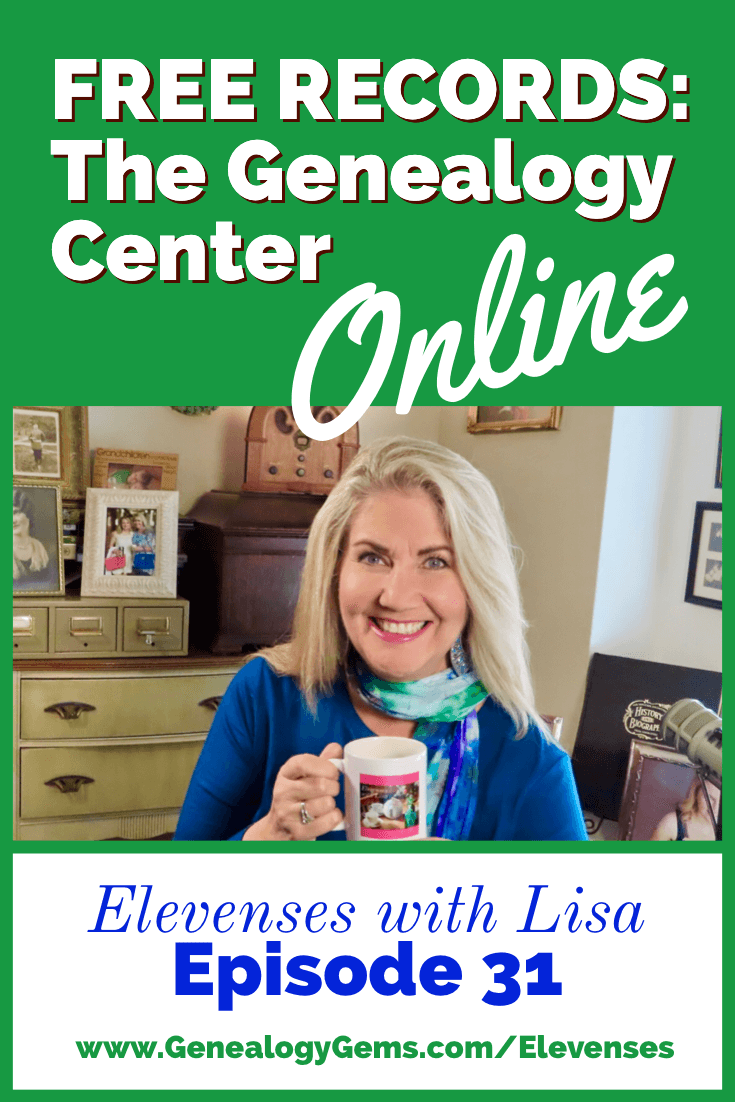
I invited Allison Singleton, Senior Librarian at the Allen County Public Library Genealogy Center in Fort Wayne, Indiana to the show. She is taking us on our tour of the website and sharing her tips and strategies for finding genealogy gems. Watch the video and follow along the highlights with the show notes below:
What is the Genealogy Center?
The Genealogy Center has one of the largest genealogy research collections available, incorporating records from around the world. The staff specializes in genealogy and is always available to help. Visit the Genealogy Center at the Allen County Public Library in Fort Wayne Indiana.
About the Genealogy Center Brochure
What Does the Genealogy Center Website Offer?
There’s a lot to explore at the Genealogy Center website. Let’s start with the top-level menu on the Home page. Here we’ll find links to important resources such as:
- Donations
- Genealogy Community
- Life StoriesPathfinders
Let’s take a closer look to a few in addition to other free resources available through the large colored buttons on the home page.
Genealogy Community
The Genealogy Community is the place to ask questions, sign up for their e-newsletter, and follow them on social media. They are extremely active on Facebook. You can also learn more about and get in touch with the staff of seasoned family history librarians.
PathFinders
PathFinders is a great place to start your family history search. It provides very small snapshots of what the Genealogy Center has in their collection for any given location or topic. Snapshot categories include:
- State Snapshots
- Subject Snapshots
- International Snapshots
Click on the logo from any page to return to the website’s Home page.
Free Databases at the Genealogy Center Website
The Genealogy Center does not interlibrary loan materials. Their collection is reference only. The website is the perfect place to plan your next visit. That being said, much of their invaluable collection has and is being scanned by Internet Archive and FamilySearch. If it is out of copyright, they work to get it online. So there’s plenty to find from the comfort of your own home.
You can find their Free Databases by clicking Resources on the home page and then Free Databases. These are all searchable and include digitized images that can be viewed from home.
In the Free Databases section you’ll find gateways to other specific areas including African-American and Native American. These provide an excellent place to start your research.
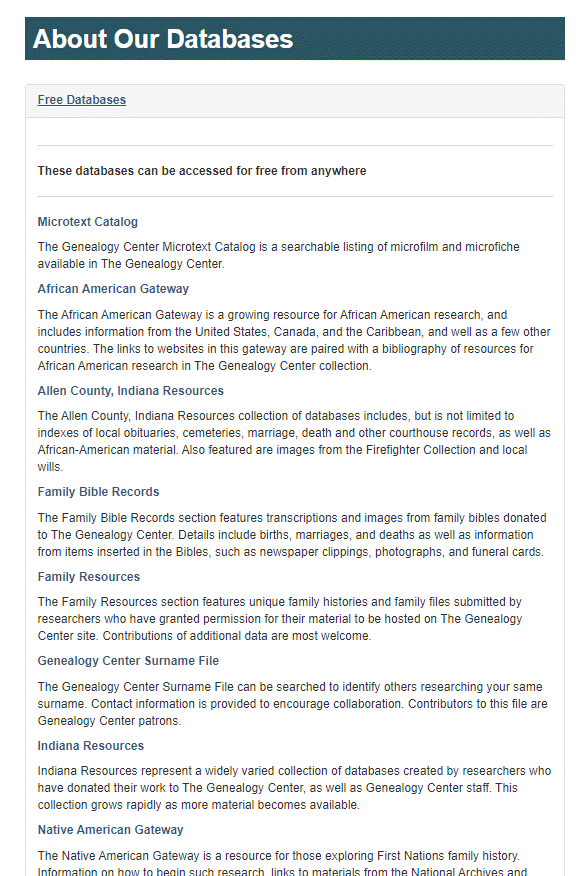
Free databases at the genealogy center
Family Bibles at the Genealogy Center Website
Navigation: Our Resources > Free Databases > Family Bibles
The Genealogy Center actively collects scans of family bible records pages.
Learn more about researching family Bibles for family history in Elevenses with Lisa episode 29.
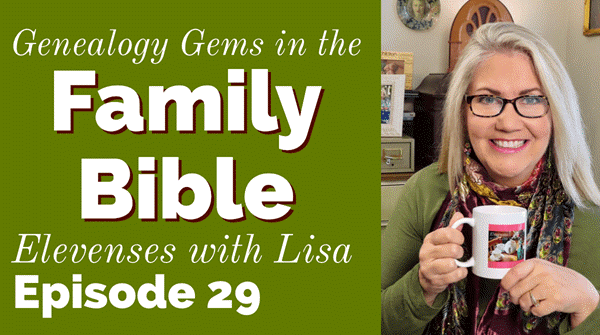
Watch episode 29 of Elevenses with Lisa to learn how to find and analyze your family bible for genealogy
Donations
You can donate more than just money to the Genealogy Center. They are also looking for research donations. Donating is a great way to make your genealogy research materials easily accessible to your family and other researchers. You’ll find Donations in the main menu on the Home page.
- Donated digitized materials are freely available online on their website.
- They are actively digitize records.
- You can even bring your materials into the library and they will digitize them. You can then keep the originals.
- You can also send in your own digitized scans.
Military Records at the Genealogy Center Website
Navigation: Our Resources > Free Databases > Our Military Heritage
They are actively collecting military information for inclusion in their collection. The collection includes many unique items donated by other family historians.
Copyright and Usage
The materials on their website are under copyright. You can view one page at a time. However, you can copy and print like you would if you were visiting the library. Include a source citation including the donor name. If in doubt about usage, contact the Genealogy Center.
Searching for Genealogy Center Content
The website is new (in 2020) so Google may not pick up everything in search. Use the website search field to search the entire collection.
Allison’s Catalog Search Tips:
- When search the Allen County Public Library catalog, don’t use common words such as county and city.
- Also, don’t use the plural form of words. For example, use directory not directories.
- After running the search, on the left side of the page under “I only want” filter your results to only the Genealogy Center by clicking Branch and then
- If an item is digitized, you will see a Web Link under More Info.
Lisa’s Search Tip: Use Control + F (PC) or Command +F (Mac) to quickly find words in a long list on a results page.
On-Site Databases at the Genealogy Center
You can only access on-site databases while in the library. No library card is required. The library does not offer an online subscription service.
Getting Help Online for Offline Resources
Navigation: On the homepage click Genealogy Community > Ask a Librarian. Here you can send brief questions and requests.
Family History Archives
Navigation: Click Family History Archives on the Home page and you’ll find links to other websites hosting Genealogy Center digitized content. Partners include:
- FamilySearch (Public Access)
- The Internet Archive (over 110,000 items)
- Linkpendium
- WeRelate

Over 110,000 Free records at the Internet Archive from the Allen County Public Library Genealogy Center
City Directories at the Genealogy Center
City Directories are a wonderful way to fill in information between census years. The Genealogy Center has the largest collection of city directories in the country. They are in both book form and microfilm.
The city directory collection cover across North American and even includes some international directories.
Compiled Family Histories at the Genealogy Center
Compiled family histories help you stand on the shoulders of other accomplished researchers. They have approximately 70,000 physical books. There are also family histories digitized and on the website. Search for the surname and include the word family. On the results page, filter down to Branch > Genealogy.
Free Consultations and Paid Professional Services
Navigation: Home > Our Services > Consultations.
The Genealogy Center offers free (yes, you read that right!) 30-minute consultations with a Genealogy Center librarian. Consultations are held by Zoom, phone or email. You don’t even have to be a library card holder! Prepare well to get the most from your consultation.
You can also hire staff at the Genealogy Center to do more extensive research for you. Another option is to request a list of local professional researchers. Visit Our Services > Forms > Research Form
PERiodical Source Index (PERSI)
Navigation: Home > Our Resources > Onsite Databases > PERiodical Source Index (PERSI)
PERSI offers a very wide range of periodicals, some of which are very unique and niche. The PERSI index is hosted by Findmpast. Search the index for free from home at Findmypast. Some of the items require a subscription.
Allison provided some excellent insider strategies for searching PERSI:
- Articles are indexed by title.
- Don’t search by keyword or “Who”.
- Most people aren’t named in the article titles. Focus on location.
You can order the articles from the Genealogy Center. $7.50 for each form which includes up to six articles. Go to Our Services > Forms > Article Fulfillment.
Resources
Get My Free Genealogy Gems Newsletter – click here.
Bonus Download exclusively for Premium Members: Download the show notes handout.
Become a Genealogy Gems Premium Member today.
Genealogy Gems Podcast Episode 248
Free Genealogy!
You will find the complete show notes for the topic discussed in this episode at the show notes page here.
This episode is brought to you by:
- StoryWorth: Visit www.StoryWorth.com/Gems for $10 off.
- MyHeritageDNA
In this episode we cover a plethora of strategies that will give you access to loads of free genealogy records and resources. We cover:
- How to follow the path of least resistance to find what you need for your genealogy research.
- The best ways to find free genealogy records online.
- What you need to know about the genealogy industry that will help you save money.
- How you can bee-line your way to the free records that are to be found at each of the big subscription genealogy websites (Ancestry, MyHeritage and FindMyPast).
- Two Google secret searches that can help you locate free genealogy resources.
- How to search online to find free records offline.
- A clever way to get free help with your genealogy brick wall.
Companion Video and Show Notes
This topic comes from my YouTube video series Elevenses with Lisa episode 21. You can find all the free Elevenses with Lisa videos and show notes at https://lisalouisecooke.com/elevenses.
Genealogy Gems Premium Members have exclusive access to the 5-page downloadable show notes handout in the Resources section of the Elevenses with Lisa episode 21 show notes page here.
Premium Members also have access to all of the archived earlier episodes. To access the Elevenses with Lisa Premium Member archive, log in to your membership at https://genealogygems.com and under in the main menu under Premium go to Premium Videos and click on Elevenses with Lisa.
Elevenses with Lisa Episode 21 – Free Genealogy! Watch the video and read the full show notes here.
Become a Genealogy Gems Premium eLearning Member
Premium Members have exclusive access to:
- Video classes and downloadable handouts
- The Genealogy Gems Premium Podcast
- Elevenses with Lisa downloadable show notes PDF
Become a member here.
Stay Up to Date with the Genealogy Gems Newsletter
The Genealogy Gems email newsletter is the best way to stay informed about what’s available with your Premium eLearning Membership. Click below to sign up today.
Follow Lisa and Genealogy Gems on Social Media:
- Instagram.com/genealogygemspodcast
- Facebook.com/genealogygems
- Pinterest.com/lisalouisecooke
- YouTube.com/GenealogyGems
Getting Your Old Home Movies Digitized with Larsen Digital
I use Larsen Digital and have been extremely pleased with the service and results. The folks at Larsen Digital have put together special and exclusive discounts for Genealogy Gems listeners and readers. Click here to learn more and receive exclusive discounts and coupon codes.
Podcast Resources
Download the episode mp3
Show Notes: The audio in this episode comes from Elevenses with Lisa Episode 21.
